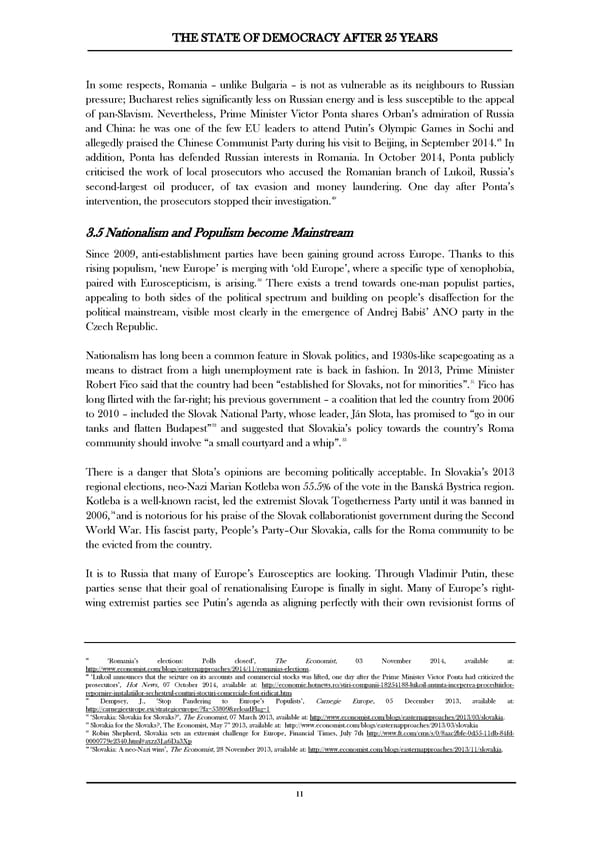THE STATE OF DEMOCRACY AFTER 25 YEARS In some respects, Romania – unlike Bulgaria – is not as vulnerable as its neighbours to Russian pressure; Bucharest relies significantly less on Russian energy and is less susceptible to the appeal of pan-Slavism. Nevertheless, Prime Minister Victor Ponta shares Orban’s admiration of Russia and China: he was one of the few EU leaders to attend Putin’s Olympic Games in Sochi and allegedly praised the Chinese Communist Party during his visit to Beijing, in September 2014.48 In addition, Ponta has defended Russian interests in Romania. In October 2014, Ponta publicly criticised the work of local prosecutors who accused the Romanian branch of Lukoil, Russia’s second-largest oil producer, of tax evasion and money laundering. One day after Ponta’s intervention, the prosecutors stopped their investigation.49 3.5 Nationalism and Populism become Mainstream Since 2009, anti-establishment parties have been gaining ground across Europe. Thanks to this rising populism, ‘new Europe’ is merging with ‘old Europe’, where a specific type of xenophobia, paired with Euroscepticism, is arising.50 There exists a trend towards one-man populist parties, appealing to both sides of the political spectrum and building on people’s disaffection for the political mainstream, visible most clearly in the emergence of Andrej Babiš’ ANO party in the Czech Republic. Nationalism has long been a common feature in Slovak politics, and 1930s-like scapegoating as a means to distract from a high unemployment rate is back in fashion. In 2013, Prime Minister Robert Fico said that the country had been “established for Slovaks, not for minorities”.51 Fico has long flirted with the far-right; his previous government – a coalition that led the country from 2006 to 2010 – included the Slovak National Party, whose leader, Ján Slota, has promised to “go in our tanks and flatten Budapest”52 and suggested that Slovakia’s policy towards the country’s Roma community should involve “a small courtyard and a whip”.53 There is a danger that Slota’s opinions are becoming politically acceptable. In Slovakia’s 2013 regional elections, neo-Nazi Marian Kotleba won 55.5% of the vote in the Banská Bystrica region. Kotleba is a well-known racist, led the extremist Slovak Togetherness Party until it was banned in 2006,54 and is notorious for his praise of the Slovak collaborationist government during the Second World War. His fascist party, People’s Party–Our Slovakia, calls for the Roma community to be the evicted from the country. It is to Russia that many of Europe’s Eurosceptics are looking. Through Vladimir Putin, these parties sense that their goal of renationalising Europe is finally in sight. Many of Europe’s right- wing extremist parties see Putin’s agenda as aligning perfectly with their own revisionist forms of 48 ‘Romania’s elections: Polls closed’, The Economist, 03 November 2014, available at: http://www.economist.com/blogs/easternapproaches/2014/11/romanias-elections. 49 ‘Lukoil announces that the seizure on its accounts and commercial stocks was lifted, one day after the Prime Minister Victor Ponta had criticized the prosecutors’, Hot News, 07 October 2014, available at: http://economie.hotnews.ro/stiri-companii-18254188-lukoil-anunta-inceperea-proceduirlor- repornire-instalatiilor-sechestrul-conturi-stocuri-comerciale-fost-ridicat.htm 50 Dempsey, J., ‘Stop Pandering to Europe’s Populists’, Carnegie Europe, 05 December 2013, available at: http://carnegieeurope.eu/strategiceurope/?fa=53809&reloadFlag=1 51 ‘Slovakia: Slovakia for Slovaks?’, The Economist, 07 March 2013, available at: http://www.economist.com/blogs/easternapproaches/2013/03/slovakia. 52 Slovakia for the Slovaks?, The Economist, May 7th 2013, available at: http://www.economist.com/blogs/easternapproaches/2013/03/slovakia 53 Robin Shepherd, Slovakia sets an extremist challenge for Europe, Financial Times, July 7th http://www.ft.com/cms/s/0/8aac2bfe-0d55-11db-84fd- 0000779e2340.html#axzz3La6Da3Xp 54 ‘Slovakia: A neo-Nazi wins’, The Economist, 28 November 2013, available at: http://www.economist.com/blogs/easternapproaches/2013/11/slovakia. 11
 The State of Democracy After 25 Years Page 11 Page 13
The State of Democracy After 25 Years Page 11 Page 13